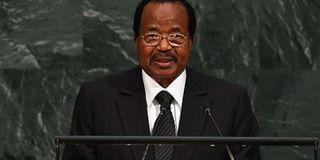Cameroon imposes curfew in English-speaking region

Cameroon President Paul Biya. The journalist had been covering hos Cabinet reshuffle. PHOTO | TIMOTHY A. CLARY | AFP
What you need to know:
- The curfew starts at 8pm and ends at 6am.
- The turmoil in the two English-speaking regions has been on since October 2016 when a lawyers' and teachers' strike snowballed into a general outcry against marginalisation.
- There have been calls for the secession of the minority anglophones.
- Scores of people have been killed in clashes between government troops and protesters, and an estimated 30,000 others have fled to Nigeria.
YAOUNDÉ
Authorities have imposed a week-long night curfew in the tense English-speaking Northwest Cameroon, citing an “imminent attack” by secessionists “with support of mercenaries” from the Niger Delta in nearby Nigeria.
A leaked internal memo from Defence minister Joseph Beti Assomo to the regional governors of Northwest and Southwest regions, ordered that the curfew between 8pm and 6am should take effect from Saturday.
CURFEW
Northwest regional Governor Adolphe Lele Lafrique said in an application order that movement of people and property has been restricted for “one week renewable”.
He said all businesses and public places would remain closed while night travel buses were expected to leave town before 8pm.
The restriction, however, does not apply to “administrative authorities, forces of law and order, persons and vehicles in possession of special authorisations to circulate and ambulances,” the governor’s order said, threatening to prosecute anyone who violates it.
The turmoil in the two English-speaking regions has been on since October 2016 when a lawyers' and teachers' strike snowballed into a general outcry against marginalisation by the predominantly francophone government and calls for the secession of the minority anglophones.
Scores of people have been killed in clashes between government troops and protesters, and an estimated 30,000 others have fled to Nigeria.
PATRIOTISM
In an address Saturday night, long-serving President Paul Biya, who will celebrate his 85th birthday on Tuesday, said the situation in the English-speaking regions “is stabilising,” but critics have described the sentiments as “far from reality”.
President Biya who has ruled Cameroon since 1982, called on the youth to be patriotic internet users…“and not passive followers or naive relays for staunch critics of the Republic”.
He said the youth are “the country’s leaders in the decades ahead.”
YOUTH DAY
There were growing calls for an anglophone boycott as Cameroon commemorated the 52nd edition of the National Youth Day on Sunday.
On February 11, 1961, a plebiscite was held in the then Southern Cameroons – today's English-speaking Northwest and Southwest regions – over whether to join Nigeria, which had already obtained independence from Britain, or the Republic of Cameroon, which had obtained independence from France.
Voters elected to become part of French-speaking Cameroon under a federal system. A year later, the country celebrated the first National Youth Day.
On the National Youth Day, which is a public holiday, learners from primary to tertiary levels, youth groups and youth wings of legalised political parties take part in marches, parades and sporting activities.





